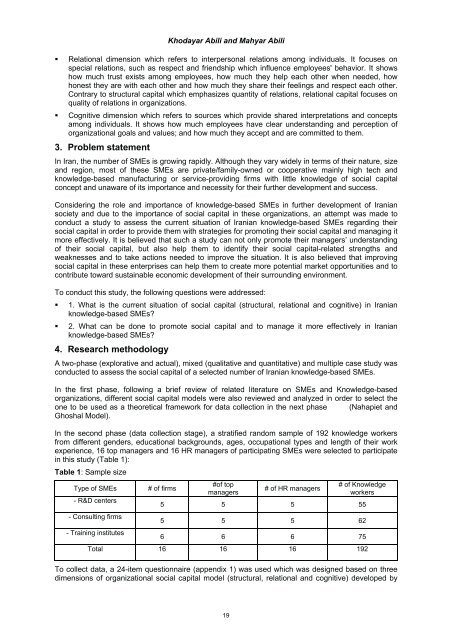Proceedings of the 3rd European Conference on Intellectual Capital
Proceedings of the 3rd European Conference on Intellectual Capital
Proceedings of the 3rd European Conference on Intellectual Capital
You also want an ePaper? Increase the reach of your titles
YUMPU automatically turns print PDFs into web optimized ePapers that Google loves.
Khodayar Abili and Mahyar Abili<br />
Relati<strong>on</strong>al dimensi<strong>on</strong> which refers to interpers<strong>on</strong>al relati<strong>on</strong>s am<strong>on</strong>g individuals. It focuses <strong>on</strong><br />
special relati<strong>on</strong>s, such as respect and friendship which influence employees' behavior. It shows<br />
how much trust exists am<strong>on</strong>g employees, how much <str<strong>on</strong>g>the</str<strong>on</strong>g>y help each o<str<strong>on</strong>g>the</str<strong>on</strong>g>r when needed, how<br />
h<strong>on</strong>est <str<strong>on</strong>g>the</str<strong>on</strong>g>y are with each o<str<strong>on</strong>g>the</str<strong>on</strong>g>r and how much <str<strong>on</strong>g>the</str<strong>on</strong>g>y share <str<strong>on</strong>g>the</str<strong>on</strong>g>ir feelings and respect each o<str<strong>on</strong>g>the</str<strong>on</strong>g>r.<br />
C<strong>on</strong>trary to structural capital which emphasizes quantity <str<strong>on</strong>g>of</str<strong>on</strong>g> relati<strong>on</strong>s, relati<strong>on</strong>al capital focuses <strong>on</strong><br />
quality <str<strong>on</strong>g>of</str<strong>on</strong>g> relati<strong>on</strong>s in organizati<strong>on</strong>s.<br />
Cognitive dimensi<strong>on</strong> which refers to sources which provide shared interpretati<strong>on</strong>s and c<strong>on</strong>cepts<br />
am<strong>on</strong>g individuals. It shows how much employees have clear understanding and percepti<strong>on</strong> <str<strong>on</strong>g>of</str<strong>on</strong>g><br />
organizati<strong>on</strong>al goals and values; and how much <str<strong>on</strong>g>the</str<strong>on</strong>g>y accept and are committed to <str<strong>on</strong>g>the</str<strong>on</strong>g>m.<br />
3. Problem statement<br />
In Iran, <str<strong>on</strong>g>the</str<strong>on</strong>g> number <str<strong>on</strong>g>of</str<strong>on</strong>g> SMEs is growing rapidly. Although <str<strong>on</strong>g>the</str<strong>on</strong>g>y vary widely in terms <str<strong>on</strong>g>of</str<strong>on</strong>g> <str<strong>on</strong>g>the</str<strong>on</strong>g>ir nature, size<br />
and regi<strong>on</strong>, most <str<strong>on</strong>g>of</str<strong>on</strong>g> <str<strong>on</strong>g>the</str<strong>on</strong>g>se SMEs are private/family-owned or cooperative mainly high tech and<br />
knowledge-based manufacturing or service-providing firms with little knowledge <str<strong>on</strong>g>of</str<strong>on</strong>g> social capital<br />
c<strong>on</strong>cept and unaware <str<strong>on</strong>g>of</str<strong>on</strong>g> its importance and necessity for <str<strong>on</strong>g>the</str<strong>on</strong>g>ir fur<str<strong>on</strong>g>the</str<strong>on</strong>g>r development and success.<br />
C<strong>on</strong>sidering <str<strong>on</strong>g>the</str<strong>on</strong>g> role and importance <str<strong>on</strong>g>of</str<strong>on</strong>g> knowledge-based SMEs in fur<str<strong>on</strong>g>the</str<strong>on</strong>g>r development <str<strong>on</strong>g>of</str<strong>on</strong>g> Iranian<br />
society and due to <str<strong>on</strong>g>the</str<strong>on</strong>g> importance <str<strong>on</strong>g>of</str<strong>on</strong>g> social capital in <str<strong>on</strong>g>the</str<strong>on</strong>g>se organizati<strong>on</strong>s, an attempt was made to<br />
c<strong>on</strong>duct a study to assess <str<strong>on</strong>g>the</str<strong>on</strong>g> current situati<strong>on</strong> <str<strong>on</strong>g>of</str<strong>on</strong>g> Iranian knowledge-based SMEs regarding <str<strong>on</strong>g>the</str<strong>on</strong>g>ir<br />
social capital in order to provide <str<strong>on</strong>g>the</str<strong>on</strong>g>m with strategies for promoting <str<strong>on</strong>g>the</str<strong>on</strong>g>ir social capital and managing it<br />
more effectively. It is believed that such a study can not <strong>on</strong>ly promote <str<strong>on</strong>g>the</str<strong>on</strong>g>ir managers’ understanding<br />
<str<strong>on</strong>g>of</str<strong>on</strong>g> <str<strong>on</strong>g>the</str<strong>on</strong>g>ir social capital, but also help <str<strong>on</strong>g>the</str<strong>on</strong>g>m to identify <str<strong>on</strong>g>the</str<strong>on</strong>g>ir social capital-related strengths and<br />
weaknesses and to take acti<strong>on</strong>s needed to improve <str<strong>on</strong>g>the</str<strong>on</strong>g> situati<strong>on</strong>. It is also believed that improving<br />
social capital in <str<strong>on</strong>g>the</str<strong>on</strong>g>se enterprises can help <str<strong>on</strong>g>the</str<strong>on</strong>g>m to create more potential market opportunities and to<br />
c<strong>on</strong>tribute toward sustainable ec<strong>on</strong>omic development <str<strong>on</strong>g>of</str<strong>on</strong>g> <str<strong>on</strong>g>the</str<strong>on</strong>g>ir surrounding envir<strong>on</strong>ment.<br />
To c<strong>on</strong>duct this study, <str<strong>on</strong>g>the</str<strong>on</strong>g> following questi<strong>on</strong>s were addressed:<br />
1. What is <str<strong>on</strong>g>the</str<strong>on</strong>g> current situati<strong>on</strong> <str<strong>on</strong>g>of</str<strong>on</strong>g> social capital (structural, relati<strong>on</strong>al and cognitive) in Iranian<br />
knowledge-based SMEs?<br />
2. What can be d<strong>on</strong>e to promote social capital and to manage it more effectively in Iranian<br />
knowledge-based SMEs?<br />
4. Research methodology<br />
A two-phase (explorative and actual), mixed (qualitative and quantitative) and multiple case study was<br />
c<strong>on</strong>ducted to assess <str<strong>on</strong>g>the</str<strong>on</strong>g> social capital <str<strong>on</strong>g>of</str<strong>on</strong>g> a selected number <str<strong>on</strong>g>of</str<strong>on</strong>g> Iranian knowledge-based SMEs.<br />
In <str<strong>on</strong>g>the</str<strong>on</strong>g> first phase, following a brief review <str<strong>on</strong>g>of</str<strong>on</strong>g> related literature <strong>on</strong> SMEs and Knowledge-based<br />
organizati<strong>on</strong>s, different social capital models were also reviewed and analyzed in order to select <str<strong>on</strong>g>the</str<strong>on</strong>g><br />
<strong>on</strong>e to be used as a <str<strong>on</strong>g>the</str<strong>on</strong>g>oretical framework for data collecti<strong>on</strong> in <str<strong>on</strong>g>the</str<strong>on</strong>g> next phase (Nahapiet and<br />
Ghoshal Model).<br />
In <str<strong>on</strong>g>the</str<strong>on</strong>g> sec<strong>on</strong>d phase (data collecti<strong>on</strong> stage), a stratified random sample <str<strong>on</strong>g>of</str<strong>on</strong>g> 192 knowledge workers<br />
from different genders, educati<strong>on</strong>al backgrounds, ages, occupati<strong>on</strong>al types and length <str<strong>on</strong>g>of</str<strong>on</strong>g> <str<strong>on</strong>g>the</str<strong>on</strong>g>ir work<br />
experience, 16 top managers and 16 HR managers <str<strong>on</strong>g>of</str<strong>on</strong>g> participating SMEs were selected to participate<br />
in this study (Table 1):<br />
Table 1: Sample size<br />
Type <str<strong>on</strong>g>of</str<strong>on</strong>g> SMEs # <str<strong>on</strong>g>of</str<strong>on</strong>g> firms<br />
#<str<strong>on</strong>g>of</str<strong>on</strong>g> top<br />
managers<br />
# <str<strong>on</strong>g>of</str<strong>on</strong>g> HR managers<br />
# <str<strong>on</strong>g>of</str<strong>on</strong>g> Knowledge<br />
workers<br />
- R&D centers<br />
5 5 5 55<br />
- C<strong>on</strong>sulting firms<br />
5 5 5 62<br />
- Training institutes<br />
6 6 6 75<br />
Total<br />
16 16 16 192<br />
To collect data, a 24-item questi<strong>on</strong>naire (appendix 1) was used which was designed based <strong>on</strong> three<br />
dimensi<strong>on</strong>s <str<strong>on</strong>g>of</str<strong>on</strong>g> organizati<strong>on</strong>al social capital model (structural, relati<strong>on</strong>al and cognitive) developed by<br />
19
















